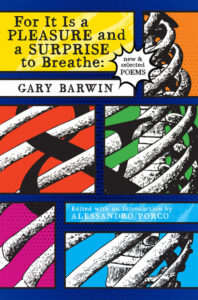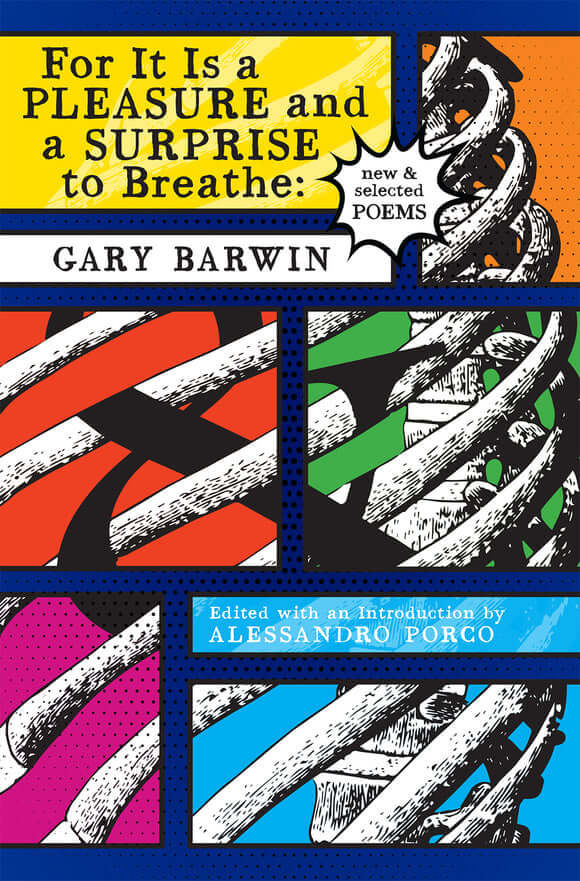 By Skylar Kay
By Skylar Kay
For It Is a Pleasure and a Surprise to Breathe
by Gary Barwin
Buckrider Books (2019)
Gary Barwin’s collection of poetry For It Is a Pleasure and a Surprise to Breathe displays Barwin’s wide range as a poet. Many sections are fairly experimental in nature, delving into visual art and alliterative abstraction. Other poems in the collection are more traditional — I would say more accessible and enjoyable. Topics in the collection range from an alliterative play about a baboon moon canoe, all the way to “Sesame Street’s Count is my Grandfather” which explores Barwin’s relationship with his Jewish ancestry in a humourous, gut-wrenching, and illuminating way.
As someone who prefers the more traditional, less avant-garde pieces of this collection, I did not enjoy every poem in this collection, and most readers will likely feel the same. I would go as far as to say that if I flipped to a random page, I would probably dislike the poem on it. However, the poems that did resonate with me were more than enough to make the collection worth a read. Most of the collection could be classified as experimental or surrealist, at times focusing more on sound than anything else such as in “Moon Baboon Canoe” which makes even less sense than the title itself. Other poems are purely visual, such as “Murmuration” — a picture of a family of deer whose heads are replaced by teeth with punctuation marks on them. At times the collection felt like a fever dream, at other times a very obfuscated art installation, but the occasional flashes of brilliance made me, someone who has no interest
in that style of writing, glad I kept reading. Such simple lines as “My grandmother in her bed … her breath / her breathing / in the garden / leaves / leaving / we hold her breath / breathing” manages to blend the best parts of Barwin’s poetry for me, as the sound repetition works in tandem with just a hint of surrealism to pack a punch that I will not forget. Other poems, specifically the musings on Basho’s frog-pond haiku, are less traditionally poetic but instead offer a deep insight I have not encountered before, stating “The moment of illumination is not that instant when the frog hits the surface of the pond … it is that moment when the frog knows it is going to leap … we are deceived by the sound of water.” It is Barwin’s poetic range from absurd surrealism, to touching personal poems, to great insights on the nature of a four-hundred-year-old poem that makes this collection repulsive, alluring, and a must-read all at the same time.
I would also be doing a great disservice to the collection if I did not discuss the introduction by Alessandro Porco. This lengthy intro to Barwin’s writing dives deep into Barwin’s history as a writer, musician, and person as a whole. The Harpsichord Moon section of this collection would seem truly a disjointed mess without this history and explanation of Barwin’s musical past, as well as an analysis of some of the poems themselves.
Gary Barwin’s collection felt like some kind of alliterative acid trip. If that is what you’re looking for, this book is for you. Between these trips, there are also poems that shock the reader back to reality with grounded and touching poems about family and Barwin’s Jewish ancestry, focusing the vivid imagery in Barwin’s mind back to a recognizable plane just long enough for a deep insight into human nature. If that is what you are looking for, this collection is also for you. The collection is a brilliant balance of insanity and insight, and I’d read it all over again.
Skylar Kay is a not-so-new writer who has a passion for Japanese forms, specifically haiku. Her work has appeared in several online and print journals, including Autumn Moon Haiku Journal and Ephemerae.


